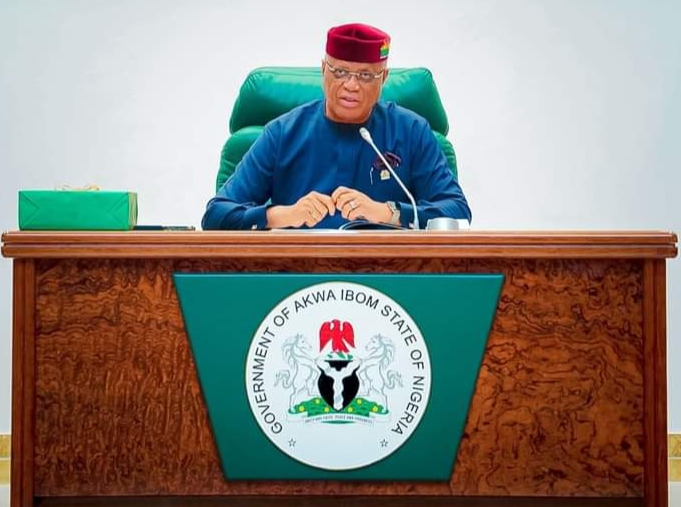Mr Umo Eno, Governor, Akwa Ibom State.
By Ukpong Ukpong
There is an impending energy crisis of global scale that threatens our very existence as a country. Yet, Nigeria continues to postpone action towards averting this apocalypse which could wipe away our major source of revenue, taking lives like the Holocaust.
Yes, energy transition is apocalyptic. It’s even worse considering its inevitability. Energy transition has become a growing threat to poor countries for years now since the world began seriously considering reducing consumption of fossil fuels and moving towards cleaner energy sources by 2060.
The move to cleaner energy portends grave danger to Nigerians in particular because our country will suffer severe disruptions being a monolithic economy unless we double our effort towards diversification and building a strong non-oil economy.
Having participated in the COP 28 Climate Change Conference, held in Dubai, United Arab Emirates, last year, the writer had expected to hear the governor, Pastor Umo Bassey Eno, address issues on climate, some of which may threaten the security of the state and implementation of budgets. At least a mention in the governor’s 2024 new year message about plans on energy transition would have been a welcomed reassurance.
Honestly, such expectations are not too high because here we are in 2024, just six years from when federal government proposes to end gas flaring with threat of divestment from our economy by international oil companies, IOCs, who insist they won’t stop polluting our environment. We don’t expect state governments to keep wishing away a subject matter that threatens to take away our means of survival.
READ: Net-zero emission: Osinbajo seeks reserved funding for gas projects in Nigeria
Although we may find rhetoric on climate change obnoxiously double standard and hypocritical, we can’t ignore their proponents because they control global finance and direct investments. We can’t afford to fold our hands and do nothing after participating in these climate conferences where they lay out clear action plans with timelines on key decisions that will have direct impact on our economy.
There is much at stake for Akwa Ibom state because in the event that we do not plan towards averting effects of energy transition, the prospect for oil bearing states like ours would be far worse. According to an energy expert, Mr. Mfon Gabriel, the dwindling federal allocations to sub-national is merely a preview of what awaits them when Nigeria can no longer earn from its fossil fuel few decades from now.
To underscore the seriousness of this threat, an official of Natural Resources Governance Institute, NRGI, Tengi George-okoli maintains that “energy transition will affect oil revenues, threatening income from FAAC allocations, 13% derivation funds and other oil related income streams.”
They both agree that situation will be worse for oil producing states who will be left for generations to deal with the profound legacy environmental degradation and poverty left behind by international oil companies divesting their fossil fuel interests and shifting to renewables.
Our state government should start now to plan for the inevitable future when oil revenues are depleted. Let’s avert an economic Holocaust while we can. Recall in his 2024 New Year message that Governor Eno appealed for citizen input in governance, saying “I call on you to continue to pray for us, support us and bind our thoughts and actions with love … I know we can count on you to get this done”.
Such a sincere appeal by the governor deserves an equally altruistic advocacy towards securing our collective future. So, on the strength of this, a Media Advocacy Group on Energy Transition (MAGET), Akwa Ibom State, coordinated by Abasifreke Effiong, Managing Editor, The Dune Newspaper calls on Governor Umo Eno to domesticate the National Energy Transition plan as soon as possible and strive to achieve SDGs 7 (Affordable and Clean Energy), 11 (Sustainable Cities and Communities) and 13 (Climate Action).
Also, the governor should demand that the Federal Government and IOCs carry out comprehensive environmental audit, remediation, clean up and restoration of host communities ahead of the 2060 energy transition timeline. In addition, the governor should ensure that the State interrogates decommissioning and abandonment plan for stranded oil assets in our communities.
Furthermore, our state can lead in reducing fossil fuel-based power projects, invest in research on home-grown innovations on clean energy, organise training and capacity building for youth and women on large-scale renewable energy (solar, hydro and wind) projects, and environmental management.
Finally, while prioritising investments in sustainable agriculture, maritime and solid minerals, our governor should make efforts to commit towards savings in the State Reserve Fund.
















